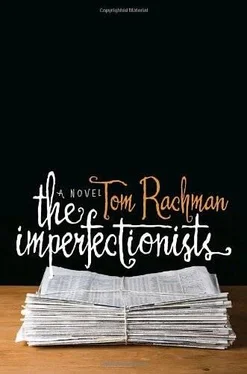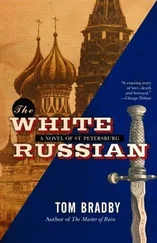They turn back toward the office.
"Actually," Kathleen says, "I remember blood on your kitchen floor that night. Dario and I got there after you'd taken Cosimo to the hospital. We let your maid in. What was her name? Rina? She didn't know what to do. She didn't want to get blood on the mop-she thought you'd be angry-so I wiped it up with a copy of the paper."
"I know," Ornella says. "It's the copy I'm missing. I need you to give me a new one."
"A paper from 1994? I don't know where you'd find one. We threw away our hard-copy archives years ago. It's all digitized now."
"You can't be serious."
The women walk on in silence, arriving outside the office finally.
"Do you remember our conversation at the hospital that night?" Kathleen asks. "When I said I was thinking of going to Washington but that I was undecided. You told me I should. That I should leave Rome, and Dario, and take the job."
"I never said that."
"Yes," Kathleen responds, "you did."
On Tuesday morning, Marta knocks four times and waits. She has keys, so she enters. Ornella appears in her nightgown.
"Oh, sorry," Marta says, bowing her head.
"You left me in a terrible situation Sunday without my paper," Ornella says. "Absolutely unforgivable!" She wants to retract this. Instead, she retreats into her bedroom.
She dresses and returns to the living room, shifting framed photographs as if her outburst had not happened. "If I sit here," she explains to Marta, "I can see Massi when I look up from reading the paper. And if I sit over there, I can see Cosimo. Or should I put Dario here? You know, if you don't move pictures about, you stop noticing them."
Marta, who is brushing rubbish into her dustpan, nods politely.
Without another word, Ornella withdraws to her room.
"You want paper today, Signora Ornella?"
"No," she says through the closed bedroom door. "Thank you."
She hears the front door shut, and so emerges. Marta has left a note, asking for a particular brand of cleaning fluid and more paper towels. "How on earth," Ornella says, "does this girl get through so many paper towels?" She checks for dust under the sofa. While she's bent down there, snooping about, a drop of liquid plops onto the wooden floor. She touches her face; it was a teardrop. With a hard sniff, she gains control of herself. She wipes off the floor with her bare hand, dabs her eyes, stands.
Dario will come if needed, but she won't beg him. Her other son, Filippo, avoids her totally-he picked up his father's intellectual contempt for Ornella. And the grandchildren? They seem to be afraid of her.
She misses Cosimo. Their last decade together consisted of doctors and medicine, moments of hope and months of hopelessness. (She never told Dario and Filippo how their father really died, that he was discovered with a note saying, "Enough." She informed everyone that he had died of heart disease. In a corner of her mind, she knows that her sons know. It is the same corner into which she has secreted all manner of knowledge that she, at once, knows and does not know: about the existence of mobile phones, about the Internet, about what people think of her.)
She opens the stepladder below the storage space. She reaches the top and the two doors, behind which lie her papers. She has never climbed up here. She opens both doors and inhales-the storage space has a metallic smell, a scent she had vaguely considered to be that of her fingers. The space is high and deep, and filled nearly to capacity. More than ten thousand papers. Over a hundred thousand pages. A half-million articles. All those labored lines, placed up here to wait their turn.
The turn of tomorrow has come, and it has gone. Nowhere will she find a copy of April 24, 1994. She must move on to April 25. But skipping a day has a peculiar effect: these stacks seem far less authoritative all of a sudden-less like the paper and more like plain paper. She smacks a pile on the left, the side she has read, and yanks out a few copies. She tosses them down from the storage space.
In the air, the folded pages separate; sheets float gently to the floor.
She pulls out more, a thick pile this time, and drops them. They hit the floor with a thud and splay out. She pulls out still more. She dumps newspapers until her arms ache and the floor around the ladder is heaped high.
She considers the piles still remaining in the storage space, the unread papers. She slides off the one on top, April 25, 1994, and tosses it to the floor. She hauls out a handful more, then another.
She keeps this up for almost an hour until, her hands black with ink, knees wobbling on the top rung, she is done. The storage space is empty; the floor is an ocean of black-and-white.
She climbs down, unsure how to step off. She treads on papers and, losing her footing, thrusts out her arms, jewelry tinkling, and flops gently atop the lot. She slides a little way down the heap, gasps, then comes to a halt, laughing. "Silly girl!"
A boldface headline catches her eye: "… Afghan Capital." She tugs out the edition, which tears slightly under her. The headline reads, "Taliban Fighters Capture Afghan Capital" (the paper of Sept. 28, 1996). She digs through the pile and picks another paper at random: "In Record, Dow Closes Above 6,000" (Oct. 15, 1996). And another: "Clinton Beats Dole to Win 2nd Term" (Nov. 6, 1996). She is lying on 1996, it seems.
She pushes these aside, digging down to 1998: "Clinton Denies Sex with Intern" (Jan. 27, 1998); "A 'Titanic' Haul as Ship Flick Sinks 11 Oscars" (March 24, 1998); "Scores Killed in Twin Attacks on U.S. Embassies in East Africa" (Aug. 8, 1998); "House Impeaches Clinton" (Dec. 20, 1998).
She reaches the new millennium: "Dow Tops 11,000" (Jan. 15, 2000); "Milosevic Quits Amid Protests" (Oct. 6, 2000); "Iraq Rejects New Inspections" (Nov. 2, 2000).
The headlines from 2002 perplex her: "Trade Center Debris Cleared from Ground Zero" (May 31, 2002); "Bomb Attack in Bali Leaves Dozens Dead" (Oct. 13, 2002); "Bush Establishes 'Homeland Security' Agency" (Nov. 26, 2002).
She tunnels down to 2004: "Scientists Clone 30 Human Embryos" (Feb. 14, 2004); "Putin Wins Re-Election" (March 15, 2004); "U.S. Transfers Power to Iraq Interim Leaders" (June 29, 2004); "Islamic Extremist Kills Dutch Filmmaker" (Nov. 3, 2004).
She skips ahead to 2006: "In His First Veto, Bush Blocks Stem-Cell Research" (July 20, 2006); "North Korea Claims First Nuclear Test" (Oct. 10, 2006).
And then 2007: "Amid Fanfare, Apple Introduces iPhone" (Jan. 10, 2007); "Bush to Send 21,500 More Troops to Iraq" (Jan. 11, 2007); "Humans Are Cause of Climate Change, Panel Finds" (Feb. 3, 2007); "In Historic Bid, African-American Senator to Run for President" (Feb. 11, 2007).
With that, she is done. This, approximately, is the present.
She stands amid all the papers and thinks about Marta, who comes tomorrow. Ornella could clear up beforehand. Then again, Marta will be impressed-no more nonsense about old papers on one side, new papers on the other. And no more technology bans-no drama if Marta's husband calls her cellphone while she's here.
The next day, Ornella races to the door. "I have something to show you. Come, come!" She tries to take Marta's hand, but the cleaner is still removing her coat. Ornella waits restlessly. Marta has today's paper hidden in a plastic bag, as per standing instructions. "Come!" Ornella says. But midway down the hall she pauses.
"What?" Marta asks.
"You're going to think I'm stupid." She takes the cleaner's hand. Marta doesn't grip back but allows herself to be drawn forward.
"Oh dear," Marta says, seeing the mess. "It break?"
"Did what break?"
Marta is already on her knees, tidying up this paper catastrophe.
"Nothing's broken. I did it on purpose. Nothing to worry about. I threw them down there myself," Ornella protests. "I spent all night reading. Till four in the morning. I'm still nowhere near caught up. I have all sorts of questions. You're going to have to help me."
Читать дальше












